#language lover
Text
“She’s everything, he’s just Ken” is made all the more hilarious knowing that ken literally just means “who?” in at least 8 languages
#barbie#ken#barbie movie#she’s everything#he’s just ken#translation#langblr#language#language blog#languageblr#language meme#language memes#linguistics#linguistics humor#language learning#linguistics memes#linguistics blog#lingblr#studyblr#language lover#lingblog#linguistics tumblr#languages#linguistics jokes
614 notes
·
View notes
Text
The Difference Between ということだ and というものだ
~ということだ has two different meanings. Let's take a look at each one and their sentences.
1st meaning: I hear that... / It is said that...
Nuance: You want to convey the information you have obtained from a source; either from the TV, news, or a person.
• ニュースによると、明日は雨が降るということだ。
It is said that it will rain tomorrow according to the news.
2nd meaning: It means that... / In other words,...
• 田中さんに「明日から来なくてもいいからね」と言われた。つまり、首ということだ。
I was told by Mr. Tanaka "You don't have to come in from tomorrow." In other words, I was fired.
• 最近、運動するとすぐ疲れて…年と取ったということですね。
Lately, I'm getting tired easily when I exercise. It means that I'm getting old.
---------------------------------------------------
Now, let's look at ~というものだ
Meaning: it is a general knowledge that... / it is common sense that...
Nuance: to describe something everybody knows as a general knowledge or a common sense fact.
• N5 を勉強している人が N2 に合格するのは無理というものだ。
It is impossible for someone who is studying N5 to pass N2.
• 責任をとるのがリーダーというものだ。
Taking responsibility is what a leader is all about.
#study japanese#japanese#jlpt#jlpt n1#jlpt n2#jlpt n3#jlpt n4#jlpt n5#language#learn japanese#nihongo#language lover#studyblr#study blog#study notes#tips#grammar#japanese grammar
28 notes
·
View notes
Text
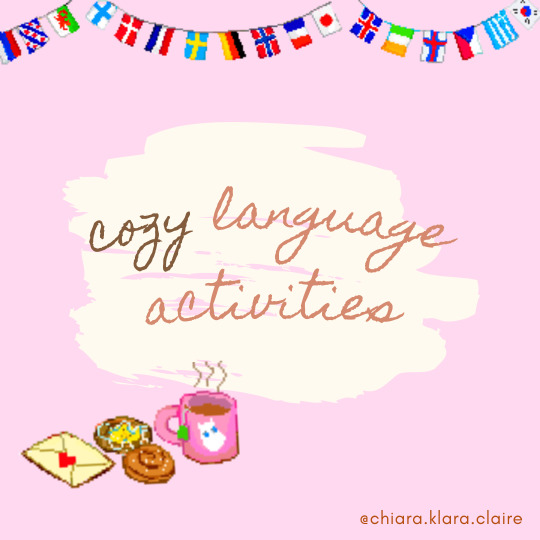

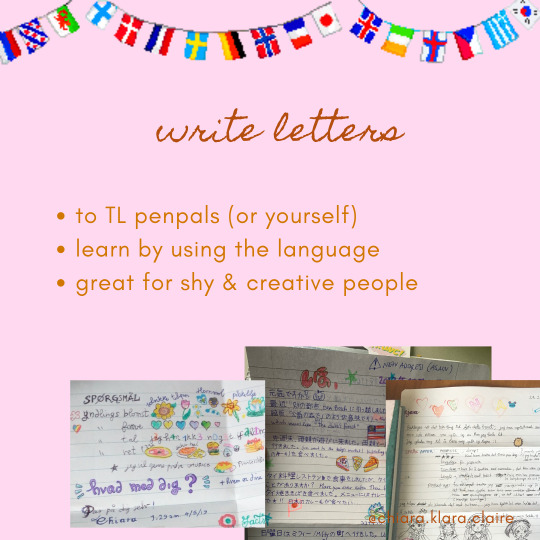
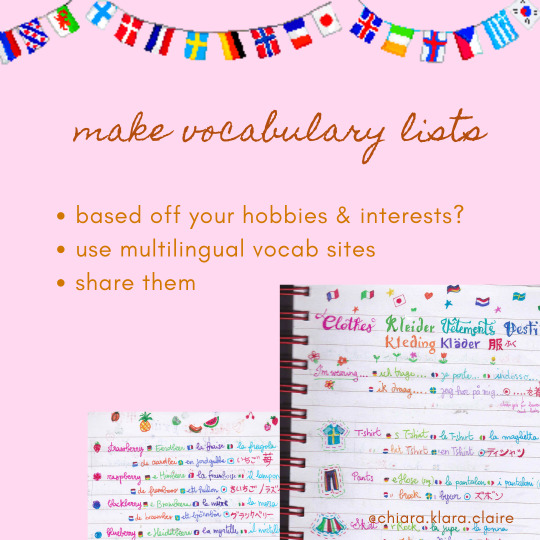
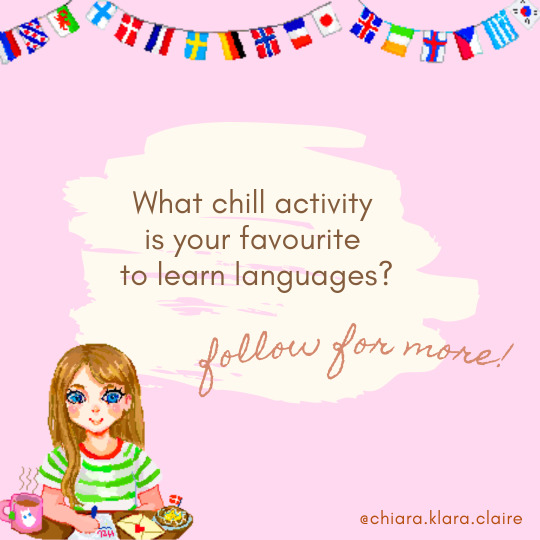
three cozy ways to practice languages (imo as a creative soul). On my masterpost you find vocabulary sites and more. Another cozy thing for me is looking up through my resources list to spice up things hehe. [art here 100% mine - @dreamyberry]
42 notes
·
View notes
Text
Language Learning Resource! (Video)
I feel like this video is a PERFECT outline of what you should be actively doing to learn another language.
—
youtube
—
Here’s the main takeaways with some of my own ideas thrown in:
1. Don’t learn a language with the intent to enjoy fun things in your target language LATER after you gotten to whatever your target level of fluency is: Just go ahead and start now! Watch the TV show you want to watch even if you don’t understand any of it yet, you’ll get there eventually.
2. You do not need to be speaking all the time with others to get good at speaking. It helps, but it should not be solely relied on. OP gives a good example of what he did wrong in the video.
3. Speaking a language isn’t due to knowledge like learning math is, it’s more like a muscle that is always working for the sake of function.
4. You can’t just do 30 minutes days and expect to be fluent eventually. You need to be using your target language as much as possible (aka immerse yourself). Immersion takes much more than 30 specific minutes out of your day. I actually do this all the time, talk to yourself in your target language, read your target language (I follow a lot of social media accounts in my target language so I constantly see it), text others in your target language, watch videos/movies, voice shadowing etc etc. You may even be able to feel when your brain is in (insert language here) mode. Me personally I can tell, and I notice that if I’m in Japanese mode it’s hard to absorb things in Mandarin or other language
5. Mindset is everything. If you think constantly about how hard something is, you will always feel like the task is hard. If you are learning a notoriously hard language, and ruminate about this, it will only hurt you in the long run. When I started learning Mandarin as a kid no one ever told me it was hard before, and I picked it up fast, and I only slowed down when I got frustrated about how hard the language is but sped back up when I reminded myself that input and immersion will get me the results I’m looking for eventually no matter which language.
—
#langblr#studyblr#language learning material#language learning resources#language lover#language learning#language study#language stuff#learning reference#learning resources#language lessons#language learning resource
39 notes
·
View notes
Text
ない+そう=なそう?なさそう?
Attaching the ~そう ending to the negative form can be tricky. Luckily, the rules are quite straightforward.
Verbs = なそう
要らない → 要らなそうだ
行けない → 行けなそうだ
聞かない → 聞かなそうだ
Remember that いない (negative form of いる) belongs in this category.
いない → いなそうだ
Adjectives = なさそう
寒くない → 寒くなさそうだ
安い → 安くなさそうだ
面白い → 面白くなさそうだ
Remember that a standalone ない (negative form of ある) is also treated as an adjective.
問題ない → 問題なさそうだ
However, adjectives whose plain form ends in ない should get a なそう ending rather than なさそう.
危ない → 危なそうだ
少ない → 少なそうだ
幼い → 幼そうだ
汚い → 汚そうだ
A good rule of thumb: なさそう should only be used if it isn’t unnatural to attach は or が particles directly before it.
#japanese#grammar#polyglot#studying#langblr#japanese language#study japanese#language study#japanese langblr#japanese studyblr#language learning#language lover#yuria studies
101 notes
·
View notes
Text
💘 Love is in the air, and what better way to celebrate the season of love than by learning the beautiful language of Hebrew? 🥰
I'm thrilled to present to you the opening video for Valentine's Day, where we'll dive deep into the world of love phrases. And today, we're kicking it off with a classic: "How to say 'I love you' in Hebrew." ❤️
By the time you're done watching the video, you'll not only know how to say it but also how to say it with genuine emotion and heart.
So, whether you're planning a romantic gesture, want to surprise a loved one, or simply wish to embrace the beauty of expressing love in different languages, this video is your gateway to the world of love in Hebrew.
Explore the nuances of this heartfelt phrase, and let's celebrate love, language, and everything in between 📖💌💬💕
#i love you#hebrew#learnhebrew#romance#language lover#love blog#jumblr#language#hebrew langblr#love story#love affair#lovers#love#language learning#langbr#langblr#happy valentine's day
12 notes
·
View notes
Text
Chinese Music I Listened to This Spring/Summer
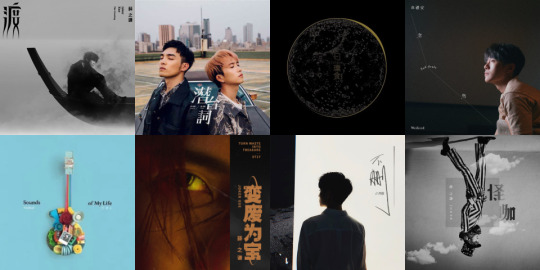
I think it’s been a few months since I posted about Chinese music/cpop, so I thought I’d provide an update on what I’ve been listening to this past spring/part of summer.
And of course, I made a Spotify playlist to go along with this post. And each song name is linked to YouTube for those of you who don’t use Spotify. The Spotify playlist includes a few “bonus” songs.
薛之谦 / Joker Xue
In my last music post, I called 薛之谦 “my latest Mandopop obsession.” I’ve still been listening to his music a lot, but I’ve had different songs on repeat lately. His slower and quieter songs have been speaking to me a lot more.
《像风一样》 is the musical version of a deep breath. But a sorrowful, long deep breath. The lyrics are quite sad really, but this song also makes me feel at peace.
《哑巴》 is that song that I never skip when it comes on shuffle. It starts out very quietly, so sometimes in the car I can’t even hear that it’s begun, But it picks up towards the middle/end.
《那是你离开了北京的生活》 was a song I used to overlook. But luckily I gave it a second chance! It’s once again a sad yet beautiful song. The lyrics are making me tear up a bit, not gonna lie.
《变废为宝》 kinda goes over my head lyrically, but the vibe isn’t as sad as the previous 3 songs. It gives me a slightly hopeful feeling.
《动物世界》 is the darkest and gloomiest out of these 5 songs. It sounds a bit on-edge and unsettled.
韦礼安 / WeiBird
Similarly, I’ve also continued listening to 韦礼安 this spring.
《女孩》 was love at first listen when I heard it covered on Chuang 2021 (which I just watched this spring). I instantly went to look up who it was by and was pleasant surprised to see it was a 韦礼安 song! This song is just so cute—but in a good way!
《不用告诉我》 was not very memorable to me at first, but then I found that I had the line 让我卑微地享受 片刻的永久 stuck in my head. Oddly, this song really feels like an album intro song to me, but it’s #6 in the tracklist.
《记得回来》 has pretty simple lyrics that I think many of us can understand, which is a huge plus. It’s the perfect song to belt along to (even as someone who sucks at singing).
《忽然》 is basically the definition of a song that starts slow and then builds up to an explosion. It even has a nifty guitar solo. 10/10 recommend.
《如果可以》 is a huge hit for a reason. It does give off major “movie theme song” vibes, which can be a turn-off, but I still like it. Also, there are official Japanese and Korean versions, so if you’re learning those languages, check them out!
徐佳莹 / LaLa Hsu
《言不由衷》 is a song I’ve heard many times before because I’ve listened to the album it’s from a lot. Oddly, it never stood out to me before, but I somehow “rediscovered” it this spring and really fell in love.
邱锋泽 / Feng Ze
《冰山》 is just super catchy! Part of me registers that the lyrics are actually a bit sad, but I end up singing along with a smile on my face. Whoops.
《年青有为》is one of two songs to the same melody. The other song is sung in Cantonese, and it’s called 《一表人才》. They both also include singer 吕爵安. Honestly this song isn’t that special. I just like it.
《潜台词》 is actually a duet with 黄伟晋. This song really drilled its way into my head. I seriously cannot stop humming it! It has a somewhat slow and mellow but also hard-hitting. Surprisingly, I don’t mind the rap (I’m not a big rap fan).
《日环食》 was the first Feng Ze song that clicked with me. It’s a relatively simple song, but that’s not necessarily a bad thing. It feels quite earnest.
九泽CP / Nine Chen & Feng Ze
九泽CP is a duo comprised of Nine Chen (陈零九) and Feng Ze (邱锋泽). I have to learn how to distinguish their voices (something I am not good at in general). This feels like cheating somehow because it means I have way too many Feng Ze songs here.
《偷走你的心》 is bubblegum pop, but I love it. It’s so infectious and makes me feel bubbly. I love the little opening sax(?) moment too. It reminds me a bit of a kpop song with the short rap sections. Only thing I don’t like is that it’s too short!
《绝对发言》 has a lot in common with the previous song, but it’s a little more funky and spirited in my opinion. If you like one, I’m sure you’ll like the other.
《最后一秒钟》 is quite different from the two right above. It’s more somber and serious, but I think the duo pulled off this style very well as well. It does not feel nearly like a 5 minute song!
井胧 / Jing Long
I was introduce to Jing Long while watching Chuang 2021, and *SPOILER* I was very upset that he did not make it to the final because I love his unique voice! Fortunately, he seems to be doing pretty well for himself from what I’ve seen.
《不删》 is another song that I can understand very easily. Sometimes I feel a bit silly listening to a song about WeChat, but obviously this song is about much more than just that. Jing Long’s voice conveys the emotions so well.
《丢了你》 - In the time between when I started drafting this post and today, this song was removed from US Spotify and then added back. Get your act together, Spotify and music labels! I was distressed to see it greyed out—then it suddenly reappeared! But anyway the song is really good.
华晨宇&杨宗纬 / Hua Chenyu & Aska Yang
《国王与乞丐》 is not at all a recent discovering, but for some reason I’ve been drawn back to it lately. It’s a lovely duet. But something wacky has been going on with the 《异类》 album on US Spotify too. I kept having to remove and then readd this song to my playlist. You’ve been warned!
#chinese music recs#cpop#c-pop#c pop#mandopop#chinese music#chinese language#mandarin chinese#langblr#language#languages#language blog#language learning#learning languages#language study#language lover#learn chinese#learn mandarin#learning chinese#learning mandarin#language studyblr#薛之谦#薛之謙#Xue Zhiqian#韦礼安#韋禮安#weibird#邱锋泽#邱鋒澤#feng ze
189 notes
·
View notes
Text
My Issues with the Language Learing Community
First of all, I love being part of the language learning community and don't have a general grudge against it or anything but I do still have some issues.
Assumptions: People generally assume that everyone learns languages for output and that input is just important to learn and keep the language alive. Not everyone learns languages for output. Maybe they just wanna enjoy media in other languages and don't have the desire to speak or write the language.
Resources: Discussions about resources are more often than not extremely classist. And apart from that there's the constant bashing of certain resources (Duolingo), and whilst I wouldn't recommend Duolingo as the only source for language learning, it certainly is one. And if someone only wants to use Duolingo and nothing else, that's their choice. Yes, it's heavily gamified but there are people who keep learning a language due to that gamification (like me). And the bashing is so annoying to me because it's mostly like "Bah, it doesn't work for me, I'll go back to my textbook" and I'm always sitting there like "yeah, do that. Nobody's forcing you to use Duolingo, it's fine to not use it if it doesn't work for you."
Toxic productivity: The language community has a tedency to toxic productivity. It's always like "do something in your target language every day" and whilst that is good advice it also makes me feel bad when I literally cannot do something in my TL on low energy days. Though it does happen, it's very seldom that people tell you that taking breaks is okay. And the other point on toxic productivity is that people will tell things that work for them as if they would work for everyone. I don't have a problem with people who say like "This is what works for me" if people ask questions like "How can I be consistent in language learning?" but I do have a problem with people who are like "Do this!" as if it was the only way or the only right way to do things.
21 notes
·
View notes
Photo
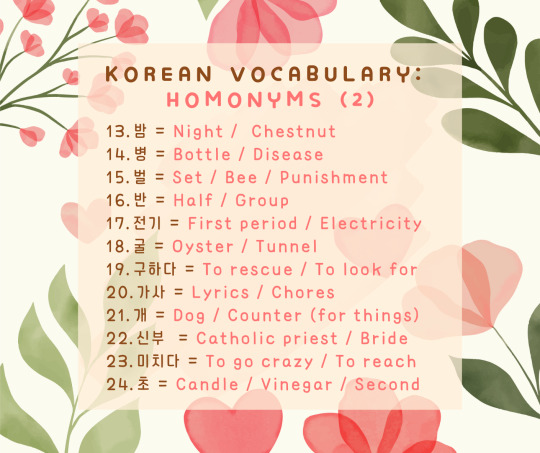
𝐊𝐨𝐫𝐞𝐚𝐧 𝐕𝐨𝐜𝐚𝐛𝐮𝐥𝐚𝐫𝐲: 𝐇𝐨𝐦𝐨𝐧𝐲𝐦𝐬 (𝟐)
13.밤 = Night / Chestnut
14.병 = Bottle / Disease
15.벌 = Set / Bee / Punishment
16.반 = Half / Group
17.전기 = First period / Electricity
18.굴 = Oyster / Tunnel
19.구하다 = To rescue / To look for
20.가사 = Lyrics / Chores
21.개 = Dog / Counter (for things)
22.신부 = Catholic priest / Bride
23.미치다 = To go crazy / To reach
24.초 = Candle / Vinegar / Second
-
Kindly Visit My Blog Here
Available Products Here
Available Korean Writing Notebook Here
#한국어#한국어 단어#한국어 연습#Korean Language#Korean Vocabulary#Korean Words#Korean Vocab#Korean Vocabulary List#Learn Korean#Study Korean#homonyms#한국어공부#Hangul#한국어 공부하기#한국어공부중#한국어공부해요#한국어배우#Language Lover#한국어 배우기
96 notes
·
View notes
Text


More Chinese study
Anyone have any self study tips for mandarin? Would really appreciate it💖
#language challenge#chinese#langblr#studyblr#language learning#language lover#language study#my study blog#langblog#my study space#my studyblr#study#study challenge#china#language#study blog#langbr
33 notes
·
View notes
Text

#era#langblr#language#language blog#languageblr#language meme#language memes#swedish#svenska#språk#linguistics#linguistics humor#language learning#english#linguistics memes#linguistics blog#lingblr#studyblr#language lover#lingblog#linguistics tumblr#languages#linguistics jokes
544 notes
·
View notes
Text
Words with a cute literal meaning
🇮🇸 ástfanginn - love-captured: in love 💘
🇳🇴 🇸🇪 🇩🇪 øyeblikket/ögonblick/Augenblick 👁 - eyeblink: moment
🇩🇪🇩🇰 Kindergarten, børnehavet - children garden
🇸🇪 påsklilja - Easter lily: daffodil
🇸🇪 färgglad - color-happy: colorful
🇳🇴 🇩🇰 kjæreste/kæreste - dearest - partner (gender neutral)
🇳🇴 kjærlighet på pinne - love on a stick: lollipop 🍭
🇳🇴 å være glad i noen/noe - to be happy in sb/smthing: to love
🇮🇹 🇳🇱 🇩🇰 pulcinella di mare, papegaaiduiker, søpapegøj* 🦜🌊 - sea pulcinella (black&white carnival character), diver parrot, sea parrot*: puffin
🇮🇹 🇩🇪 stelle filanti, Luftschlangen 🌟 🐍 - stringy stars, air snakes - streamers 🎊
🇮🇹 solare ☀️- solar: adjective for a happy, positive person
🇮🇹 occhi della madonna** - Virgin Mary eyes: forget-me-nots
🇮🇹 Viola del pensiero - viola of the thought: pansy
🇮🇹 🇪🇸, Catalan - Principe azzurro/ príncipe azul/Príncep blau 🫅🔷: (light) blue Prince: Prince charming
🇮🇹 avere il sangue blu 🩸🔹- to have blue blood: to be of noble birth
🇬🇧 Sunny side up 🍳☀️ - 🇮🇹 occhio di bue - bull’s eye 👁🐮
🇩🇪 Edelweiß - Noble white
🇩🇪 Götterspeise - dish/fare of the gods: a gelatine pudding
🇩🇪 Abendland - Evening land: the West
🇩🇪 Liebesknochen 🦴💕 - love bone: éclair
🇩🇪 Gänsefüßchen 🦆 - tiny goose feet: quotation marks ‘‘’’
🇩🇪 🇫🇮 Das All, maailmankaikkeus- ”the all” “the world’s all”: the Universe (kiitos @pclysemia)
🇮🇹 🇸🇪 🇳🇱 chiocciola, kanelbulle, apenstaartje 🐌 🐒- snail, cinnamon bun, monkey tail: @ (at)
🇯🇵 花火【はなび】 🔥 🌺- fire flower: firework 🎆
🇫🇷arc-en-ciel - arch-in-the-sky: rainbow 🌈
🇪🇸 🇫🇷 cometa/cerf-volant/воздушный змей (Russian)/ بادبادک (farsi) 💫 🦌 🐍 - shooting star, flying deer, air snake, wind-little-wind: kite 🪁
🇵🇱 malinka - little raspberry: hickey💋
🇫🇮 🇳🇱 🇿🇦 hattara, suikerspin, spook asem - little cloud, sugar spider, ghost breath ☁️ 🕷️ 👻 : Cotton candy
물고기 - water meat: fish
not really cute: Faroese 🇫🇴 hvalspýggja - whale puke: jellyfish 🐳
will keep this updated when i find/remember new ones! Also next up: aesthetic idioms
*also called Lunde**not sure if it is a regional thing to call them like that
#idioms#foreign language#polylgot#language blog#language lover#langblr#my lists#mine#german#norwegian#danish#swedish#italian
56 notes
·
View notes
Text
How to use Reverso Context for Language Learning and Translation
(Not including their AI translation feature)
•••
Reverso is a website that provides dictionaries, example sentences, and machine translations for a multitude of languages.
The website has an AI translator, which in my opinion isn’t that great with Mandarin (the language I use the website for the most) so I never use it, but I don’t usually use machine/automatic translations anyways.
I use Reverso’s Context feature very often and it helps immensely with translating and learning Mandarin, as well as other languages. However, keep in mind not every language has an equal amount of quality material. It’s not ideal for beginners either, because there’s no settings to make simpler sentences show up more.
As of October 13th, 2023, Reverso supports 26 languages!
•••
How To
•••
For this example, I’m going to search the Mandarin word “平常”
* Note: A majority of the database seems to use Simplified characters, so use Simplified most of the time or it may not recognize the word.
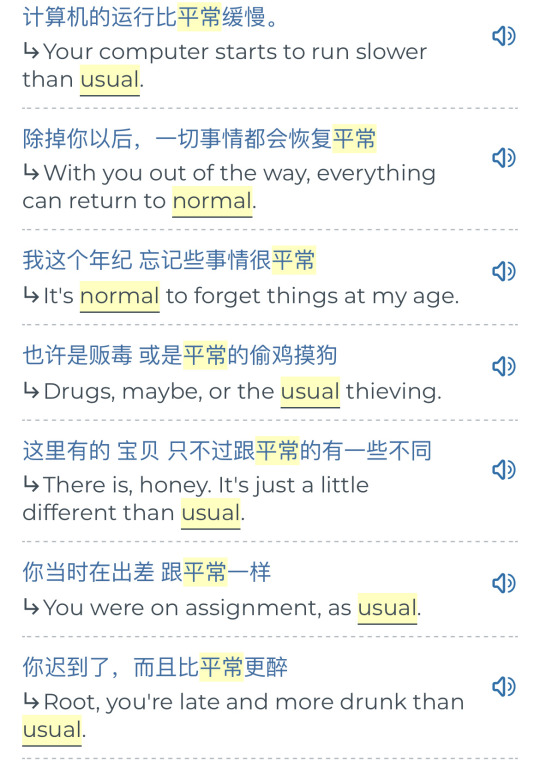
Now you can guess from context if you didn’t already have this word in your dictionary of choice: 平常 must mean ‘usually; normally; typical; etc.’
This feature works very well with common word combinations that don’t have a direct translation in a dictionary.
•••
Downsides
•••
One downside I notice a lot is that the highlighting will be incorrect or sometimes completely absent. Other times the English translation doesn’t match the example sentence at all. So, if you are not an intermediate learner be extra careful using the context function for translations.
For example, I searched the word “洒泪” (to be shedding tears) and the first result I got highlighted the translation as “during”!
But if you are signed in to the website, you can submit corrections easily.

•••
Please correct me if I made a mistake
Created October 2023
#language learning#languages#foreign languages#language#language learning material#language learning resources#language lover#language lessons#language study#study languages#study resources#language learning reccomendation#translation study#translation studies#translation software#translation#reverso
14 notes
·
View notes
Photo

#language#languages#language learning#learning languages#language lovers#language meme#language lover#language memes#languge learning#languageblr#language immersion#langauge learning#language exchange#langblur#linguistics#linguist#linguistics memes#linguists#linguistics meme#polyglots#polyglot struggles#polyglot meme#polyglot memes#polyglot#polyglot life
104 notes
·
View notes
Text
2023 summary
Another year, another obligatory summary post. I feel like posting a little early because I'm already in a sleep mode before New Year's...
2023 is a year where I did so many things! So many lifelong dreams finally fulfiled. These dreams were both language related and not, and I'd sit here all day if I were to list them all. In any case, I spent this past year quite comfortably exploring new areas of my current language journey.
What I accomplished:
Read close to 80 volumes of manga in Japanese. I read more manga than novels actually, which doesn't happen to me!
Read a few Japanese classics, including 「ドグラ・マグラ」 till the very end, for the first time after my first attempt over 6 years ago! It's definitely the most challenging Japanese book I've read so far. Some parts were so bizarre and difficult with their archaic or scientific tone that I'm definitely revisiting this book in a few years time, again, to check if I they provide less of a challenge.
Watched some more Swedish crime drama for immersion and listening, plus a few cartoons dubbed in Swedish.
Played a few games in Japanese, and also one in Swedish.
Visited Japan! It was amazing and I feel like I learned a lot of the "practical" Japanese as opposed to my previous knowledge being mostly based on media and literature. Yeah it's fun when you originally mostly remember some crazy poetic grammar but then need to figure out how to get somewhere without a smartphone.
I know I've been toying with an idea of taking up a new language (Italian), but my loyalty has shifted somewhat and now I'm debating Finnish lol. We will see if I stick by long enough to actually start.
Next year: trip to Sweden? I'm not setting any particular goals other than maybe playing the classic Persona trilogy (女神異聞録・罪・罰) in Japanese for the first time, all those guidebooks I've purchased in Japan have been gathering dust! I also need to dig through my newly acquired book stash which includes a few classics and some of my favourite Western books in Japanese translation.
#study goals#japanese#swedish#polyglot#studyblr#langblr#japanese studyblr#study japanese#swedish studyblr#swedish langblr#language lover#language study#language learning
8 notes
·
View notes
Text

In the fascinating world of language, not all words and sentences are created equal. Take, for instance, the simple phrase: "There is a heart in my soup". Now, let's switch gears and look at it through the lens of Hebrew. You'd find that it translates more like, "I have a heart in my soup."
Understanding these distinctions becomes paramount when learning a new language. It's not just about memorizing vocabulary words; it's about mastering the art of constructing sentences, understanding grammar, and harnessing the nuances of syntax.
That's precisely what we focus on in my course, "Practically Speaking Hebrew". It's not just about learning words; it's about learning how to wield them effectively, constructing sentences as locals speak, and truly understanding the beauty of the Hebrew language.
And by the way, that heart in my soup? It's not just a random image; it's my actual soup. A delightful coincidence during the month of love that I couldn't resist using to illustrate the unexpected wonders that come with language learning.
So, whether you're navigating the intricacies of grammar, perfecting your sentence structure, or expanding your vocabulary, my course is here to guide you on your language journey, one linguistic discovery at a time 📚🌟
#hebrew#learnhebrew#soup#love#hearts#heart shaped#language#hebrew langblr#langblr#jumblr#valentines#love story#language lover#language learning#langbr
9 notes
·
View notes